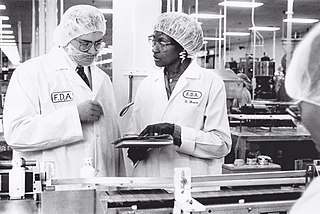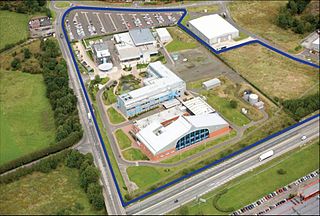
The Merck Group, branded and commonly known as Merck, is a German multinational science and technology company headquartered in Darmstadt, with about 60,000 employees and a presence in 66 countries. The group includes around 250 companies; the main company is Merck KGaA in Germany. The company is divided into three business lines: Healthcare, Life Sciences and Electronics. Merck was founded in 1668 and is the world's oldest operating chemical and pharmaceutical company, as well as one of the largest pharmaceutical companies globally.
FUJIFILM Diosynth Biotechnologies, abbreviated and often referred to as FDB, is a biopharmaceutical contract manufacturing organization that develops manufacturing processes and manufactures active ingredients and provides fill and finish services for pharmaceutical companies. FUJIFILM Diosynth Biotechnologies is the world's second largest contract manufacturer of biopharmaceuticals, with manufacturing facilities in Morrisville, North Carolina and College Station, Texas in the United States, Teesside, United Kingdom and Hillerød, Denmark in Europe, and recently added sites in Thousand Oaks, California and Watertown, Massachusetts. FUJIFILM Diosynth Biotechnologies operates a highly automated multipurpose manufacturing facility in College Station, Texas under the federal government's Center for Innovation in Advanced Development and Manufacturing (CIADM) program, which is the largest scale-out cell culture manufacturing facility in the United States.

The pharmaceutical industry is an industry involved in medicine that discovers, develops, produces, and markets pharmaceutical goods for use as drugs that function by being administered to patients using such medications with the goal of curing and/or preventing disease. Pharmaceutical companies may deal in "generic" medications and medical devices without the involvement of intellectual property, in "brand" materials is specifically tied to a given company's history, or in both within different contexts. The industry's has various subdivisions are all subject to a variety of laws and regulations that govern entire financial processes including the patenting, efficacy testing, safety evaluation, and marketing of these drugs. The global pharmaceuticals market produced treatments worth $1,228.45 billion in 2020, in total, and this showed a compound annual growth rate (CAGR) of 1.8% given the results of recent events.
Sanofi S.A. is a French multinational pharmaceutical and healthcare company headquartered in Paris, France. The corporation was established in 1973 and merged with Synthélabo in 1999 to form Sanofi-Synthélabo. In 2004, Sanofi-Synthélabo merged with Aventis and renamed to Sanofi-Aventis, which were each the product of several previous mergers. It changed its name back to Sanofi in May 2011. The company is a component of the Euro Stoxx 50 stock market index. In 2023, the company’s seat in Forbes Global 2000 was 89.

Schering AG was a research-centered German multinational pharmaceutical company headquartered in Wedding, Berlin, which operated as an independent company from 1851 to 2006. In 2006, it was bought by Bayer AG and merged to form the Bayer subsidiary Bayer Schering Pharma AG, which was renamed Bayer HealthCare Pharmaceuticals in 2011. Schering was listed on the Frankfurt Stock Exchange and had 26,000 employees as of 2004.

Canine influenza is influenza occurring in canine animals. Canine influenza is caused by varieties of influenzavirus A, such as equine influenza virus H3N8, which was discovered to cause disease in canines in 2004. Because of the lack of previous exposure to this virus, dogs have no natural immunity to it. Therefore, the disease is rapidly transmitted between individual dogs. Canine influenza may be endemic in some regional dog populations of the United States. It is a disease with a high morbidity but a low incidence of death.

ViroPharma Incorporated was a pharmaceutical company that developed and sold drugs that addressed serious diseases treated by physician specialists and in hospital settings. The company focused on product development activities on viruses and human disease, including those caused by cytomegalovirus (CMV) and hepatitis C virus (HCV) infections. It was purchased by Shire in 2013, with Shire paying around $4.2 billion for the company in a deal that was finalized in January 2014. ViroPharma was a member of the NASDAQ Biotechnology Index and the S&P 600.

Boehringer Ingelheim Animal Health is a multinational animal health company, formed in January 2017 when Merial was acquired by Boehringer Ingelheim and merged with Boehringer Ingelheim's existing animal health assets.

Sugammadex, sold under the brand name Bridion, is a medication for the reversal of neuromuscular blockade induced by rocuronium and vecuronium in general anaesthesia. It is the first selective relaxant binding agent (SRBA). It is marketed by Merck.
Organon & Co. is an American pharmaceutical company headquartered in Jersey City, New Jersey. Organon specializes in the following core therapeutic fields: reproductive medicine, contraception, psychiatry, hormone replacement therapy (HRT), and anesthesia. Organon produces all its products outside of the United States but gets a third of its revenue from the United States.

Fred Hassan, is a Pakistan-born American business executive who works for the private equity giant Warburg Pincus and previously was CEO of three global pharmaceutical companies.
Shionogi & Company, Limited is a Japanese pharmaceutical company best known for developing Crestor. Medical supply and brand name also uses katakana (シオノギ).

The Coppertone girl sign is a landmark in Miami Beach, Florida, known for being the last operating example of a series of mechanical billboards that were constructed by the Coppertone company to advertise its tanning oil products across the United States. The sign features a young girl and a cocker spaniel puppy who is attempting to steal her swimsuit bottom; the motorized dog and swimsuit bottom rock up and down, exposing the child's tan line.

Coppertone is the brand name for an American sunscreen. Coppertone uses a variety of branding, including the Coppertone girl logo and a distinctive fragrance.

The Newhouse Research Site is a drug research facility situated 15 miles (24 km) east of Glasgow in central Scotland. It is located beside the M8 motorway in Newhouse, North Lanarkshire. The site is an early drug discovery research centre with a track record of generating a succession of products in the areas of anaesthesia and psychiatry. In 2007, the Royal Society of Chemistry Malcolm Campbell Memorial Prize was awarded to researchers for its work on a new anaesthesia drug, sugammadex. It currently employs 250 scientists across a range of disciplines including medicinal chemistry, molecular biology and drug metabolism. The site is currently the largest private drug discovery centre in Scotland, and one of the biggest in the UK.

Wyeth was a pharmaceutical company until it was purchased by Pfizer in 2009. The company was founded in Philadelphia, Pennsylvania, in 1860 as John Wyeth and Brother. Its headquarters moved to Collegeville, Pennsylvania, and Madison, New Jersey, before its headquarters were consolidated with Pfizer's in New York City after the 2009 merger.

Merck & Co., Inc. is an American multinational pharmaceutical company headquartered in Rahway, New Jersey, and is named for Merck Group, founded in Germany in 1668, of which it was once the American arm. The company does business as Merck Sharp & Dohme or MSD outside the United States and Canada. It is one of the largest pharmaceutical companies in the world, generally ranking in the global top five by revenue.
Tildrakizumab, sold under the brand name Ilumya among others, is a monoclonal antibody designed for the treatment of immunologically mediated inflammatory disorders. It is approved for the treatment of adults with moderate-to-severe plaque psoriasis in the United States and in the European Union.
Brent Saunders is an American biopharma executive and entrepreneur who is the chairman and CEO of the health company Bausch & Lomb. He helped lead various mergers and acquisitions, including the mergers between Merck and Schering-Plough, the acquisition of Bausch + Lomb by Valeant Pharmaceuticals, and the $63 billion acquisition of Allergan by Abbvie. He is the founder of special-purpose acquisition company (SPAC) Vesper Healthcare Acquisition. Saunders is also executive chairman of medical aesthetics companies The Beauty Health Company and Hugel America.












